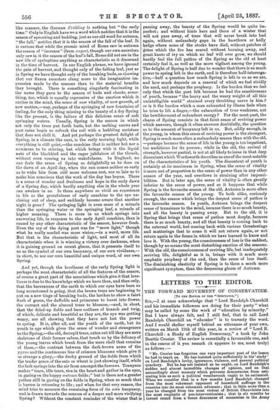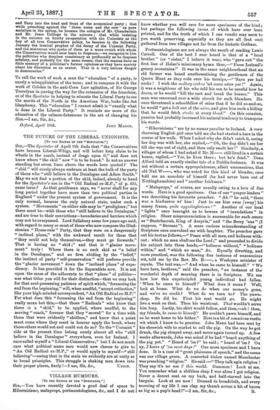LETTERS TO THE EDITOR.
THE FORWARD MOVEMENT OF CONSERVATISM. [To zuz Emma or zinc "Brimrierolt."1 Sra,—I at once acknowledge that "Lord Randolph Churchill and his immediate followers are doing for their party" what may be called by some the work of "education by minority." But I have always felt, and I still feel, that to call Lord Randolph Churchill an " educator " is to travesty the word. And I would shelter myself behind an utterance of your own, written on March 19th of this year, in a review of "Lord R. Churchill : a Study of English Democracy," a book by John Beattie Crozier. The review is essentially a favourable one, and in the course of it you remark (it appears to me, most truly) as follows :—
"Mr. Crozier has forgotten one very important part of the lesson he had to teach us. He has insisted quite sufficiently in his 'study' on Lord Randolph's levity, ignorance, violence, and general political quackery. But he has not insisted as he ought, on Lord Randolph's sudden and almost incredible changes of opinion, and on that astoundingly short memory which prevents democracies from esti- mating him as such a political weathercock ought to be estimated. When we consider that in a few months Lord Randolph changed from the most vehement opponent of household suffrage in the counties into its most vehement advocate; that in little more than a year he changed from the most violent of British Chauvinists into the most emphatic of non-interventionists ; that in six months he turned round from ti fierce denouncer of economies in the Army and Navy into the head and front of the economical party ; that while preaching against the ' three acres and the cow' as pure socialism in the spring, he became the eulogist of Mr. Chamberlain and Mr. Jean Collings in the autumn ; that while insisting in the autumn on hearty co-operation with the Unionists as the -key of all true Conservative policy, he became in the following January the ironical prophet of the decay of the Unionist Party, and the statesman who spoke of them as a mere crutch with whom the Conservatives would soon learn to dispense—we recognise in him the politician who despises consistency as profoundly as he despises sobriety, and probably for the same reason, that the masses have as little memory of a politician's former opinions as they have anxiety shoat his discretion as an orator. That is a very serious danger in democracies."
To call the work of such a man the " education " of a party, is surely a misapplication of the term; and to compare it with the work of Cobden in the anti-Corn Law agitation, of Sir George Trevelyan in paving the way for the extension of the franchise, or of the Spectator in helping to educate the Liberal Party to see the merits of the North in the American War, looks like fiat 'blasphemy. This " education " I cannot admit is" exactly what is done in the Liberal Party." It reminds me more of the education of the salmon-fisherman in the art of changing his dies.—I am, Sir, &c.,



































 Previous page
Previous page